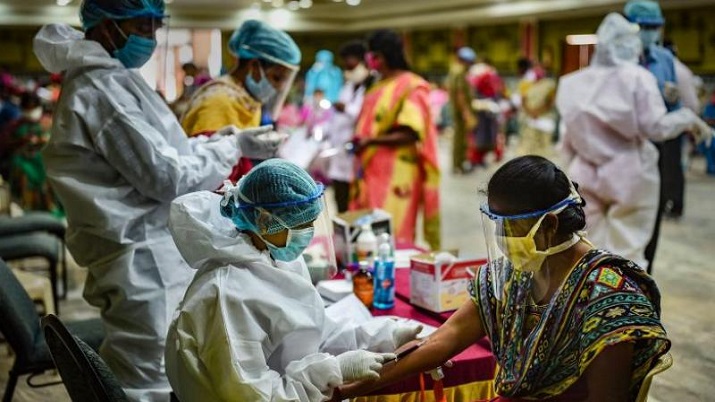
Third wave of coronavirus unlikely to be as severe as second wave: Study
The third wave of COVID-19 – if it does occur – is unlikely to be as severe as the second wave, given the extent of the spread of coronavirus infections that have already occurred in the country, a study has found. According to. The study, based on mathematical modeling analysis published in the Indian Journal of Medical Research (IJMR), highlights that expanding vaccination can significantly reduce the emergence of the third wave of coronavirus.
Presenting a vaccine ramp-up scenario where 40 percent of the population has received two doses within three months of the second wave peak, and further that the effect of vaccination is to reduce the severity of the (conservative) infection by 60 percent This demonstrates how vaccination during a potential third wave can substantially reduce the overall burden, the study said.
“Probability of a third wave of COVID-19 in India: A mathematical modeling based analysis” has been authored by Sandeep Mandal, Balram Bhargava and Samiran Panda of the Indian Council of Medical Research (ICMR) and Nimalan Arinaminpathy of the Department of Infectious Diseases. Disease
Epidemiology, MRC Center for Global Infectious Disease Analysis, School of Public Health, Imperial College London, London, UK.
Using a deterministic, compartmentalized model of SARS-CoV-2 transmission, four possible mechanisms – weakened immunity restores previously exposed individuals to a susceptible state, the emergence of a new viral variant that is immune to previously circulating strains The emergence of a new viral variant that is more transmissible than the first circulating strain and the release of the current lockdown confirming new opportunities for transmission – was screened for the third wave, the study said.
Taking into account four hypotheses for the emergence of the third wave, the study said, infection-induced immunity may attenuate over time, allowing re-infection of those already exposed, even if circulating The virus remained unchanged.
The study noted that previous work has shown how partially weakened immunity could make future waves of SARS-CoV-2 more benign, but the focus here was on the possibility of a third wave that would be a huge burden on public health. can put
Therefore, a scenario where a decrease in immunity results in a complete loss of protection, rendering immune individuals susceptible again, is considered, and several scenarios for the rate of decrease are examined, it added.
In keeping with the hypothesis of the emergence of a complete immune escape variant, the study states that even if immunity remains lifelong, it is theoretically possible for a new variant to emerge that protects against immunity induced by previously circulating strains. able to escape.
It was formulated in a simplified way, assuming that this new version still has R0 = 2.2, so is just as contagious as the second-wave virus, but (as an example) 50 percent of all of them. able to re-infect those who were previously exposed to SARS-CoV-2, the study said.
Considering the emergence of a still more transmissible variant, in the same way that the second wave is driven by a virus with R0 = 2.2, the subsequent emergence of a novel virus with high R0, but for which the first Individuals exposed to stay immunized had been modelled, it said.
The researchers said in the study that we investigated how high R0 must be for this new variant to generate a sufficient third wave.
And as far as the lockdown is concerned, the lifting of such restrictions was likely designed to allow for a third wave, he said.
The findings highlight that immune-mediated mechanisms (decreased immunity, or viral evolution to evade immunity) are unlikely to drive a serious third wave, unless such mechanisms provide protection among previously exposed people. do not do complete harm, the study said.
Similarly, a newer, more permeable version must overcome a higher threshold (R0 >4.5) to generate a third wave on its own. However, plausible mechanisms for the third wave include a new variant that is more permeable as well as able to evade the former, and lockdowns that are highly effective in limiting transmission and releasing the latter, it noted. is.
“In both cases, no third wave is likely to be as severe as a second wave,” the study said. Rapid increases in vaccination efforts could play an important role in reducing these and future waves of disease. “
“This study demonstrates the practical mechanism by which a large third wave can occur, while also showing that such a resurgence is unlikely to be as large as a second wave. Model estimates, however, are subject to many uncertainties. are, and it remains important to increase vaccination coverage to reduce any incidence,” it said.
“Preparation plans for any possible future wave will benefit from drawing approximate numbers based on current modeling practice,” the study adds.
Read also | COVID-19 third wave peak expected around September-October: IIT Kanpur study
Read also | Take the warning of third wave of COVID-19 seriously, Maharashtra Deputy CM to people
.